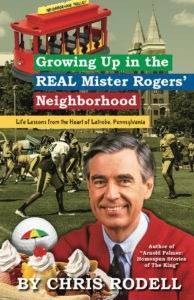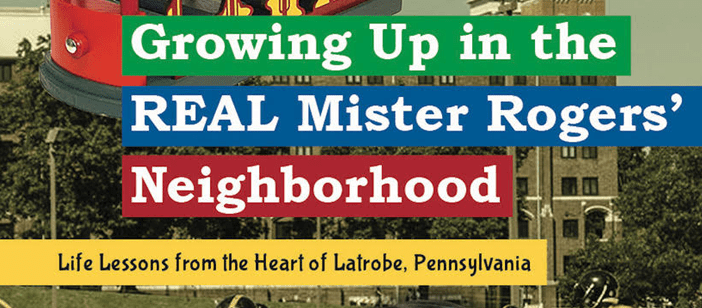From the publisher: “Chris Rodell (the local author who wrote about his oddball friendship with neighbor Arnold Palmer) is back this October with another endearing volume about life in the real Mister Rogers’ Neighborhood. Part history, part biography, Growing Up in the REAL Mr. Rogers’ Neighborhood is a freewheeling conversation about what makes this one small town so special…”
“Chris Rodell writes about Latrobe the way Sinatra sings about New York, unflinching about the gritty realities, but with abiding affection and relentless positivity about the future.” – Tom Ridge, Governor of Pennsylvania (1995–2001)
About the author: Chris Rodell is the author of Arnold Palmer: Homespun Stories Of The King, the quirky book about his oddball friendship with one of the planet’s most popular and beloved men. His books include Use All The Crayons! The Colorful Guide To Simple Human Happiness and The Last Baby Boomer: The Story of the Ultimate Ghoul Pool, a novel that was bestowed the 2017 TINARA Award for Outstanding Satire. In Rodell’s career as a freelance writer, he has wrestled alligators, raced Ferraris, gone skydiving and gained twenty pounds in one week eating like Elvis. He lives in Latrobe with his wife Valerie, their daughters, Josie and Lucy, and a small loud dog named Snickers.
 Fred Rogers died in 2003. Jesus Christ died in about 0032 and with the exception of glorious Easter sightings of The Savior neither’s been seen since. But in some essential ways, it’s like neither of them ever left.
Fred Rogers died in 2003. Jesus Christ died in about 0032 and with the exception of glorious Easter sightings of The Savior neither’s been seen since. But in some essential ways, it’s like neither of them ever left.
Their messages are timeless, as evergreen as fresh Christmas trees found growing wild on winter walks. Both emphasized forgiveness, love and understanding in eras where materialism and self seemed to swamp our better intentions. So much alike. Is Mister Rogers one of the few human beings worthy of being described as Christ-like without it sounding blasphemous?
Jesus healed the sick. Fred healed hearts.
Jesus saved our souls. Fred in 1969 saved PBS.
Jesus forgave our sins. Fred forgave Eddie Murphy.
Jesus walked on water. Fred got up nearly every morning between 4:30 and 5:30 and went swimming naked in it just about every day for as long as he lived.
But is comparing Mister Rogers to Jesus Christ outrageous? Those who do so so do with utter sincerity and are not prone to wild exaggeration.
His holiness is a lively and engaging topic in some corners of the internet
“Mister Rogers was not just special; he was a saint. He’ll never be officially offered that title, and he’d probably want it that way,” wrote Jonathan Merritt, author of Learning to Speak God from Scratch (Convergent Books, 2018) in a November 2015 article for The Atlantic. “Instead, he has been canonized in the hearts of his viewers—Saint Fred, the patron saint of neighborliness.”
“Fred Rogers was an ordained minister, but he was no televangelist, and he never tried to impose his beliefs on anyone. Behind the cardigans, though, was a man of deep faith. Using puppets rather than a pulpit, he preached a message of inherent worth and unconditional lovability to young viewers, encouraging them to express their emotions with honesty. The effects were darn near supernatural.”
An insightful January 2018 Washington Post piece by Tyler Huckabee said: “The news that Tom Hanks will be portraying Fred Rogers in a coming biopic was met with frenzied glee, as Hanks is one of the few contemporary celebrities who approaches Rogers’s universally beloved status. But even Hanks, for all his charms, doesn’t occupy the same stratosphere of Rogers’s legacy of moral and spiritual importance.”
Actress Lauren Tewes said when she was at her lowest point she heard what to her was “the voice of God.” It was on channel 13 and it was speaking through Fred Rogers.
Tewes was addicted to cocaine for the seven years she played cruise director Julie McCoy on the charmingly dippy television show “Love Boat” (1977-87, ABC). It was 1984 when, in the depths of her despair, she was drawn to the television by the opening notes to “Mister Rogers’ Neighborhood.” That’s all it took. It was like “God speaking to me through the instrument of Mister Rogers,” she says. She’s been sober ever since.
When asked by a reporter about his unwitting role in saving the actress’s life, Rogers was characteristically humble: “”How could a simple program like ours do all this? But again, the Holy Spirit can use anything.”
His own son, John, said being raised by Mister Rogers was “like having a second sort of Christ for a father,” although it can be inferred his comment was less a parental compliment and more an acknowledgment of a cross he, the son, had to bear.
A now-iconic 1978 picture of a young boy cradling Mr. Rogers’ face in his tiny hands and wearing an expression of pure joy audaciously hints at divinity. The photographer, Jim Judkis, worked for Rogers from that very day through Rogers’ death in 2003. Judkis’s daughter Maura wrote the story of the picture for The Washington Post in 2003. The father described the moment: “This boy immediately went right up to him and held out his hands to touch him, and he said ‘Mister Rogers!’ In total awe. Total awe. And that was the moment of the photo,” said Judkis. “I think it shows the pure attraction, the love … it’s like he’s seeing God, touching God. In my opinion, Fred is close to a saint,” he said.
So is the comparison warranted or is it the gulf between us sinners and the holy role model so vast that we fail to appreciate when a fellow human strives to come close?
Local clergy were asked to weigh in and relate how if having such a saintly neighbor made things easier for them.
“We’re all called to be more Christ-like,” says Tom Kennedy, senior pastor at Latrobe United Methodist Church. “Each of us is called to do better. That’s a commitment Fred Rogers took very seriously. I struggle with the idea that any one of us can be worthy of being called Christ-like. But he was one of the few men who carried himself in way that invited the comparison. He was always striving to become more like the Savior.”
His example rubs off on the civic-minded people of Latrobe, Kennedy says. “I’ve never served in a place where people are so willing to serve — and I truly believe it’s because of him.”
Martin Luther taught that we need to be “Little Christs” to one another. That was the Fred Rogers way of life says Pastor Sarah Rossing of the Saint James Lutheran Church in Youngstown (It’s where our family worships and where Val plays the organ with great passion).
“Being a little Christ means to live out our baptismal promises through His teachings,” she says. “That’s something Fred truly embodied and did more consistently than all but a few ever have.”
Another Christ-like trait was to communicate with what she calls “Quiet Courage.” We live in an era, she says, where the loudest voice often, right or wrong, persuades the most people. That’s not how Fred succeeded.
“He succeeded by saying simple and affirmative things quietly, but over and over again and again.”
His most famous lines — “Won’t you be my neighbor?,” “You Are My Friend, You Are Special,” and “It’s a Beautiful Day in the Neighborhood” — became famous because they’re positive, they’re simple and he said them throughout his life.
Jesus did the same thing with profoundly similar and similarly simple lines like “Love thy neighbor as yourself.”
“Fred was all about the quality of the words, not the volume,” Rossing says. “And in his quiet voice you could still hear a conviction and faith that is still inspiring.”
Rev. Clark Kerr recently retired from Latrobe Presbyterian Church. That was where the Rogers family worshipped and the pews to which Fred and Joanne returned when they were back in Latrobe. Kerr said he’d never call anyone Christlike because of the earthly burdens that come with the description.
“It’s not right to compare the divine with the human,” he says. “He was already under incredible pressures just every day living up to being Fred Roger. I think, too, that contributed to a sort of melancholy streak he seemed to have. I think it’s because he was touched more deeply by life than most people. That said, I do think Jesus would have smiled at the life of Fred Rogers.”
Kerr recalls The Parable of The Talents when speculating about how he thinks the life of Fred Rogers should be put in perspective. Talents, in this case, were Biblical equivalents of wealth. Before departing on a journey, the master divides up his wealth among his servants to see who ears the biggest return.
The parable is seen as Jesus’ way of urging His followers to use the gifts bestowed by God in ways that will most multiply the gifts and, hence, the glories to God.
“The master says, ‘Well done, good and faithful servant,’ and invites him into the joy of the master.”
Joanne Rogers has told interviewers that calling her late husband “Christ-like” in a way diminishes all he achieved. “Treating him like a saint keeps him two-dimensional,” she’s said. “His mission was to tell us that we all struggle, and he doesn’t exist on another plane.”
She’s right. It’s a lot to ask of mere mortals to emulate the Son of God.
Maybe that’s why God made men like Fred.
Or maybe the problem isn’t comparing Fred to Jesus. Maybe the real problem is so few of us are ever even worthy enough to invite the comparison.
This excerpt of Growing Up in the REAL Mr. Rogers’ Neighborhood: Life Lessons from the Heart of Latrobe, Pennsylvania is published here courtesy of the author and should not be reproduced without permission.

























